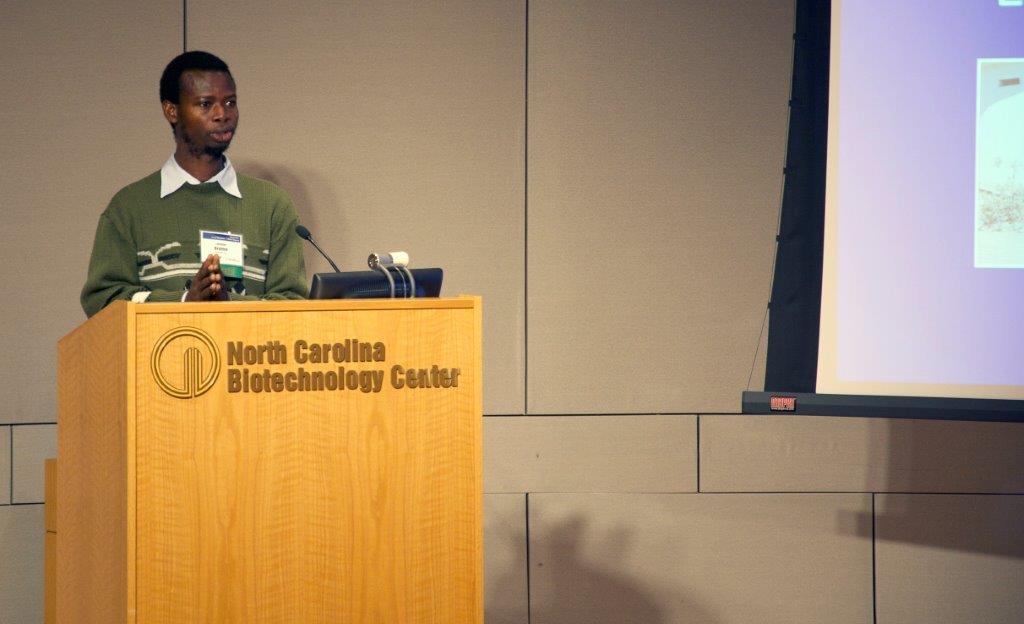
NC Rallies In Ebola Battle
 |
| Congressman David Price (center) and Ken Tindall, Ph.D., NCBiotech senior vice president of science and business development, who jointly spurred the event with support from many others, mingle with Ebola conference participants at NCBiotech. |
Ebola is a virus that has been ravaging three West African countries through much of 2014 because it thrives on fear, poverty and lack of education.
And North Carolina has much to contribute in the global struggle to help end this largest-ever Ebola outbreak.
Those are key take-away messages from a half-day conference, “Ebola NC: Local Response - Global Impact,” at the North Carolina Biotechnology Center.
The event, co-sponsored by NCBiotech and the Triangle Global Health Consortium, brought together more than 150 health professionals, policy makers and other interested participants. Presentations included speeches and panel sessions from pharmaceutical developers, academic medicine leaders, federal agencies and others working on Ebola prevention, detection and treatment strategies as well as comprehensive standards for patient care.
North Carolina is recognized around the world for its leadership in global public health – especially in detection, analysis, prevention and treatment of disease. The forum focused on the state’s wide-ranging resources being brought into battle against the Ebola outbreak.
Ironically, battles with virus kept two of the presenters from attending. One, Duke University physician and infectious disease specialist Chris Woods, M.D., MPH, was at home battling the flu. And William Fischer, M.D., a pulmonary disease specialist from the University of North Carolina at Chapel Hill, had to pre-record a video message because the World Health Organization had asked him to go to Liberia the week before.
Fischer’s message-by-proxy was an emotional recounting of his near-paralysis from fear before his first trip into the Ebola zone earlier in the year, in a visit to Guinea. He said his fear was quickly quelled when he started meeting patients and discovered “they looked just like patients I see every day here in Chapel Hill."
They weren’t bleeding from every bodily orifice, as some accounts had inaccurately described Ebola symptoms, he said. In fact, several speakers mentioned that realization has led to a re-characterizion of Ebola infection from hemorrhagic fever to simply Ebola viral disease.
Fischer also pointed out that the main reason some 70 percent of the West African patients die, versus a so-far 28 percent for those brought to the U.S. and Europe, appears to be a combination of fear and poor sanitation, health care infrastructure and cultural practices. When a loved one dies, the norm in these areas is for family members to wash the body, he said. But most people don’t have running water or soap or any way to sanitize themselves after washing Ebola victims, so they contract the virus, die, and spread it to others in a deadly spiral.
A panel of North Carolina company representatives provided perspective on drug development issues in dealing with a crisis such as this Ebola outbreak.
Michelle Berrey, M.D., MPH, is president and CEO of Chimerix, a Durham clinical-stage drug company with an anti-viral in development that has drawn public and private support for testing against Ebola. She discussed some of the challenges her company, and others, face in trying to get a drug tested, produced and approved for patients.
Also on the panel, moderated by Chris LeGrand, of GRM Futures Group, were Donna Altenpohl, vice president of U.S. policy for GlaxoSmithKline, which is developing an Ebola vaccine candidate, and Jeffrey Spaeder, M.D., chief medical and scientific officer for Quintiles, of Raleigh, the world’s largest contract research organization, which works with companies in developing medicines.
The agenda included a jam-packed lineup of presenters in the flesh, such as UNC’s William Roper, M.D., MPH; Aldona Wos, NC secretary of Health & Human Services; and Congressman David Price.
Several of the presenters reminded the group that North Carolina’s public health forces have been rallied many times before, to deal with issues such as SARS and enterovirus.
Wos outlined partnerships her agency has entered at both the state and federal level to streamline and improve the state agency’s ability to deal with these kinds of disease outbreaks.
UNC epidemiologist David Weber, M.D., said the university’s goal is to stay ahead of state and federal Centers for Disease Control guidelines in preparing for public health challenges. He gave many examples of training programs, clinic preparations, advance purchasing of limited supplies and other procedures incorporated into the UNC health care system.
 |
| Lyttelton Braima, a native of Sierra Leone who's studying at Duke, provides words of encouragement to NC's Ebola army. |
Roper, who’d served a stint as head of the CDC until 1993, said he’d never seen a patient with Ebola. Still, this outbreak is teaching much of the medical community many lessons about how to coordinate and cooperate, how to use quarantine procedures and a lot of other important information. For example, he said as the audience chortled, “yes, there’s a slimy part of politics, but we live in a democracy. It’s a losing proposition to say we should take politics out of public health. The real issue is to ensure that politics is science-driven.”
“Sometimes our minds are so open our brains have fallen out when it comes to dealing with issues of public health,” he warned.
But the final speaker of the day reassured the audience that North Carolina is, indeed , doing it right.
Lyttelton Braima, a native of Sierra Leone, is studying at Duke as a Rotary Peace Fellow. His home country is one of the three dealing with Ebola. And his family is there. He talked about his scramble to help them relocate to a safer home and to arrange for a physician friend to visit his family routinely to ensure they stay Ebola-free.
"I'm moved today," said Braima, as some in the audience became visibly emotional. "You people are actually doing something about this virus."
